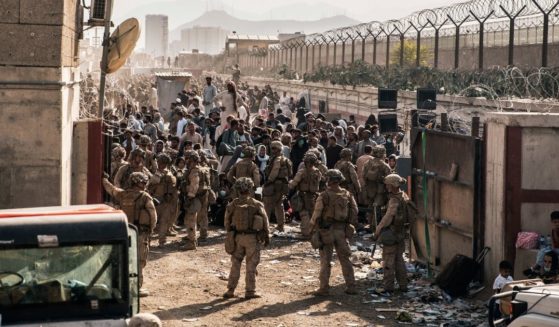
Thirteen U.S. service members were killed last month at Hamid Karzai International Airport in Afghanistan as members of the military attempted to secure an area that was essentially indefensible.
Now, we’re getting our first insight into what it was like on the ground. We’re hearing a harrowing story from a brave soldier who survived a suicide attack, and not only lived to tell about it but fought alongside others to save lives.
The Kabul airport on Aug. 26 was surrounded on all sides by Taliban combatants, Islamic State murderers and Americans and Afghan allies seeking refuge from the violence they knew would coincide with the fall of the Afghan government. It was pure chaos.
While our country’s leaders failed in essentially every facet, those on the ground did their duty — even as they watched closely for an attack they were told was imminent.
These are troops who are made of the same stuff as those who took Okinawa. If there is one small bit of comforting information we can take from the U.S. exit from Afghanistan, it is that our troops don’t lie down when facing certain death.
What do heroism, bravery and nerves of steel look like? They look like Marine Corps Maj. Ben Sutphen and those next to him who endured the August blast in Kabul near the Abbey Gate at the airport and kept fighting.
Sutphen spoke to CBS News and shared his account of what happened before and after an Islamic terrorist cowardly murdered American troops and Afghan civilians.
U.S. Marine Major Ben Sutphen was just 15 feet away during last month’s terror attack at the Kabul Airport, which killed 13 U.S. service members and an estimated 170 Afghan civilians.
“There was not a lot we could change about that situation,” he told CBS News. pic.twitter.com/nzVGs23SMW
— CBS Mornings (@CBSMornings) September 15, 2021
“We brought a truck with a loudspeaker down to try to disperse the crowd. I was standing right by that truck when [the explosion] happened,” the major told CBS News correspondent David Martin in a segment that aired Wednesday.
Martin asked, “The truck shielded you?”
Sutphen answered in the affirmative, telling CBS News he was 15 feet from the blast. He then described how injured Marines fought off the animals who were determined to shed more blood. Instead, they were cut down by American gunfire.
Those who survived the blast were stunned and began taking on gunfire from a nearby rooftop. Sutphen said one injured Marine corporal ignored a shoulder wound and focused only on neutralizing the enemy.
“He’s blown off his feet and still has his wits about him. Shot through the shoulder. Immediately recovers his weapon and puts the opposing gunmen down,” the major said.
Sutphen was asked what would have happened had the surviving Marines not returned fire.
“Without a doubt, many more Marine and civilian lives would have been lost,” he said.
Sutphen shared another story of heroism, though. He said a badly wounded Marine stood tall and fired on the enemy.
“[A]nother corporal with substantial blast injuries to his lungs and internal organs [had] enough grit and courage at, at risk of his own life, to drag another injured Marine out of harm’s way,” the major said.
It’s impossible to imagine the scene Sutphen and those injured or stunned by the blast endured. Still, they recovered their bearings in a hostile environment and saved countless people. They fought back and prevented any further loss of life.
These young heroes were put in harm’s way by their leaders, and they adapted to the conditions around them.
We all owe both the survivors and those who gave their lives that day our eternal gratitude.
